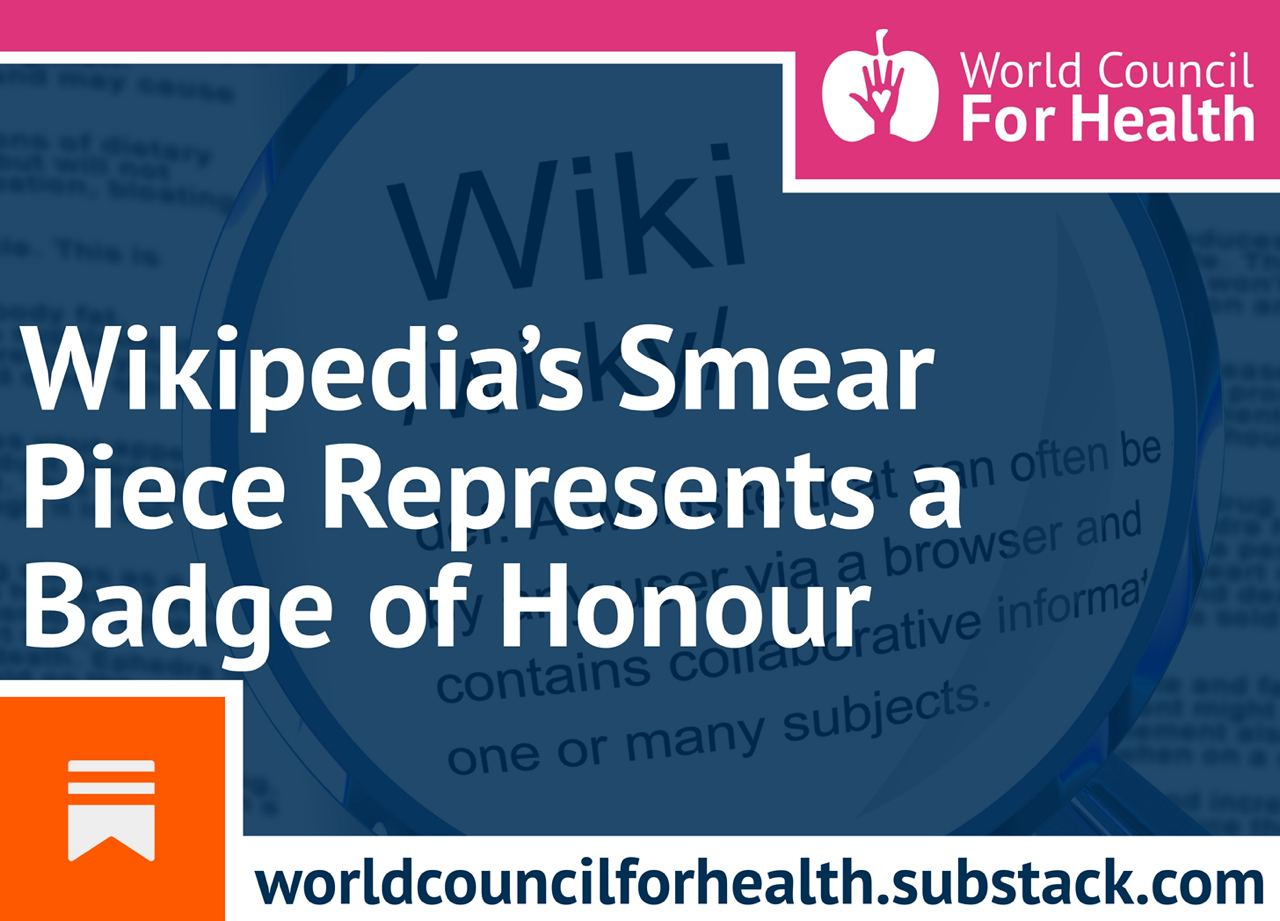Wikipedia’s Smear Piece on WCH Represents a Badge of Honour
The World Council for Health's message of health sovereignty is clearly a threat to the establishment.
They say that you pick up the most flack when you’re right over the target.
Since the Covid phenomenon began, the degree of flack has become a navigational aid in the pursuit of Truth. Wikipedia’s hit piece on the World Council for Health (WCH) is evidence that their message of health sovereignty has become a threat to the establishment.
Brainwashing goes global
Ever more brazenly over the past four years, members of the ‘Great Reset Establishment’ have been involved in a process of what Psychoanalyst Dr Bruce Scott calls ‘menticide’, or brainwashing on a global scale. Through the unethical use of applied psychology, governments, corporations, and organisations around the world have been manipulating the masses into compliance with their globalist agenda.
Whether the issue has been Covid-19, the war in Ukraine, economic meltdown, or climate hysteria, the outcome has been an environment of heightened fear and uncertainty. People seeking direction have been subjected to unprecedented levels of propaganda and censorship, which have added to the confusion by creating a ‘through-the-looking-glass’ world in which it feels like truths have become lies, and vice versa.
Wikipedia - no longer reliable
One of the ‘trusted’ sources we have become accustomed to turning to when seeking information on a host of topics is Wikipedia, The Free Encyclopedia. This online encyclopedia was established in 2001 with the aim of being a free, open, and neutral source of information that anyone could access and edit. The idea was that all sides of controversial issues would be welcomed and readers would be left to make up their own minds. But, as Wikipedia co-founder-turned-critic Larry Sanger complained in an interview with Glenn Greenwald in July 2023, “It didn’t work out that way.”
Over time, the platform has moved away from its non-negotiable editorial policy that content should strive to reflect a ‘neutral point of view’ (NPOV). As Kristin Heflin described in her PhD thesis in 2010, this means that:
… all Wikipedia content must represent―fairly, proportionately, and as far as possible without bias, all significant views that have been published by reliable sources. By insisting articles represent [―] all significant views without bias, the policy of striving for NPOV shares similarities with objectivity … (p. 89)
In 2015, Heather Ford observed in her D. Phil. Thesis that Wikipedia was by that time offering “a skewed representation of the world that favours some groups at the expense of others” (p. 3). She continued:
Instead of everyone having the same power to represent their views on Wikipedia, those who understand how to perform and speak according to Wikipedia's complex technical, symbolic and policy vocabulary tend to prevail over those who possess disciplinary knowledge about the subject being represented.
This means that Wikipedia is able to decide which facts are stabilised or destabilised on its platform, according to the ideological positions of its editors. While Wikipedia originally provided the opportunity for people to publish without the need for gatekeepers or mediators, this is no longer the case. Especially since the Covid-19 event boosted the fortunes of the Censorship Industrial Complex, Wikipedians have become foot soldiers in the battle to scrub from the Internet information they consider to be mis-, dis-, or mal-information.
Larry Sanger, in the interview mentioned above, described how he has watched Wikipedia’s neutrality evaporate over the years, shifting around 2005 to establishment views on topics like global warming and certain drugs, and starting to show bias against holistic medicine in the early 2010s. Its reliable sources of information are now left-of-centre media corporations such as CNN, MSNBC, and the New York Times, while in their policies 80% of news sources on the right are deemed unreliable. Independent news outlets and self-published subject experts are also not able to edit a Wikipedia page. Before it is deemed acceptable, information needs to be filtered through a mainstream news source, which in turn is constrained by fact-checking services.
Misrepresenting Covid dissidents
The World Council for Health (WCH) is one of many organisations and individuals who have been defamed by Wikipedia since the advent of Covid-19. As discussed at the WCH’s 83rd General Assembly meeting in April 2023, this has been part of a much broader strategy to silence dissent with regard to the so-called pandemic and its protocols.
WCH was established to challenge the official Covid response and its Wikipedia article was created in September 2022. The current Wikipedia entry is fairly close to the original version, although it has been edited a number of times. However, a number of Wikipedia pages created prior to Covid-19 have been completely amended since 2020, resulting in a ‘hero-to-zero’ fall from grace for people such as the author Dr Vernon Coleman (compare his October 2019 entry with the current article), and the early developer of the mRNA vaccine technology, Dr Robert Malone, whose role in this invention has been deleted from the page on mRNA vaccines.
Who’s fact-checking the fact-checkers? A trio of independent media creators—Derrick Broze, Jason Bassler & Joe Martino—reveal their eye-opening shared experience in dealing with fact-checkers and censorship dating back years before Covid-19 emerged.
Scarcely worth commenting on … but we shall!
Let’s take a look at the WCH Wikipedia article (accessed 18 December 2023) to see just how deeply flawed and factually incorrect it is.
Firstly, the content – comprising just eight paragraphs – is entirely inadequate. Other than stating that the organisation “appears to have been formed in September 2021” [emphasis mine], and that it was “founded by Jennifer A. Hibberd and Tess Lawrie”, nothing substantive is mentioned about what WCH is or what it does, despite its goals, values, and initiatives being clearly represented on its website and social media channels.
Secondly, most of the article attempts to smear WCH by association. The bulk of the content refers to people or organisations who are part of the broader health freedom network but neither WCH staff nor council members, including Robert F Kennedy Jr of Children’s Health Defense and esteemed cardiologist Dr Aseem Malhotra. Wikipedia maligns these experts for their efforts to cancel the rollout of the experimental Covid-19 gene therapies which, contrary to the protestations of the fact-checkers, have caused millions of deaths worldwide. Ironically, Wikipedia accuses Dr Malhotra of “cherry-picking” sources to substantiate his concerns about the jab, yet they themselves cherry-pick tangential content and questionable opinions from, with only two exceptions, rather dubious sources.
So, thirdly, let’s have a look at the references Wikipedia uses to back up its potentially libelous statements.
The reference to Kerr et. al (March 2022) is simply a brief Erratum, noting that some of the authors of the paper quoted were using ivermectin to treat patients, which one would expect as they were reporting on its efficacy.
The flawed Cochrane Review by Popp et. al (2022) that criticised a systematic review by Bryant et. al (2021) on the use of ivermectin to prevent and treat Covid-19 was thoroughly debunked in a letter sent to them by Fordham and colleagues in September 2021, but this has not been acknowledged on Wikipedia. The Bryant et al review remains in the top 10 most read out of 23 million tracked scientific papers.
Three references are to fact-checking sites: AAP FactCheck (Australia), AFP Fact Check (France), and Health Feedback (USA), which employ teams of people to prevent the dissemination of information that is not in line with the menticidal narratives of the Great Reset Establishment.
Four of the nine sources come from two Vice magazine journalists, Anna Merlan and Tim Hume. Their articles are replete with worn-out terms such as right-wing, conspiracy theorist, Covid-denier, anti-vaxxer, and mis-/disinformation-peddler. They also predictably take issue with ivermectin, common law, and even the notion of sovereign citizens! The tone of the articles ranges from wryly dismissive to scathingly scornful, with words such as discredited, nonsense, completely false, misleading, and fringe peppering the text. They also delight in reporting cases of doctors and scientists who have been barred from their professions for refusing to deny their professional oaths and personal principles. Underlying the supercilious slurs, however, runs a definite current of concern that these ‘discredited conspiracy theorists’ who are promoting health, freedom, and human rights may actually be gaining traction.
Larry Sanger reflects on how far Wikipedia has departed from its original commitment to neutrality by pointing out the features of biased reporting, all of which apply to the Wikipedia article on WCH:
negative information is so predominant that readers can infer that the authors harbor great hatred, resentment, or strong disapproval of the subject (especially when the target has a popular following among many ordinary people);
dismissive epithets and judgments are used in Wikipedia’s own voice; or
what a person is legitimately famous for is omitted, dismissed, or misrepresented
While WCH might wish to create a more accurate Wikipedia entry, this is not possible. According to the view source button, only registered users are allowed to edit this article. In other words, WCH has no right of reply.

Is there a future for Wikipedia?
Why anyone would bother to search Wikipedia for information about WCH, which has a perfectly informative website and Substack, is anyone’s guess. But the more Wikipedia produces atrocious articles like the one on WCH, the faster they will lose credibility among those who simply want information and do not have an ideological axe to grind.
In fact, it is worth subjecting this article to a well-known credibility test developed by California State University, and appropriately named the CRAAP test!
Its five components (plus comments on the WCH article) include:
Currency: Is the source up-to-date? – No, for one thing, it does not mention WCH’s second conference in 2023. Although editing of the Wikipedia article continues, no up-to-date information has been added.
Relevance: Is the source relevant to your research? – Not if one wants to know anything about WCH. But it has been very relevant to an investigation into the decline and fall of Wikipedia.
Authority: Where is the source published? Who is the author? Are they considered reputable and trustworthy in their field? – Absolutely not. Wikipedia’s policy on Reliable Sources specifically discounts independent experts in favour of large news corporations, which are committed to promoting Establishment narratives.
Accuracy: Is the source supported by evidence? Are the claims cited correctly? – Not at all. Please visit the WCH website to confirm this.
Purpose: What was the motive behind publishing this source? – The only purpose appears to be to discredit WCH.
At least in the case of the WCH article, Wikipedia’s credibility is clearly questionable. More broadly, Wikipedia co-founder, Larry Sanger, believes that the platform can no longer be trusted. Observing that it has become a useful propaganda mouthpiece for the Establishment, he mused: “If only one version of the facts is allowed, then that gives a huge incentive to wealthy and powerful people to seize control of things like Wikipedia in order to shore up their power.”
Indeed, in recent years, Google has invested substantially in the Wikipedia Foundation, paying them to provide the “most accurate and up-to-date information” for its search engine. Google is now elevating Wikipedia articles in Internet searches, using their content to populate their ‘knowledge panels’, and inserting their articles under videos on YouTube (its subsidiary) in an effort “to fight misinformation and conspiracy theories.” In this way, the actual spreaders of misinformation flood the Internet with their post-truth propaganda, causing those who value Truth, Beauty, and Goodness to look elsewhere for information.
What is particularly interesting, though, is that the Wikipedia edifice may be crumbling from within. Thanks to the transparency of the Wikimedia system, one is able to peer behind the curtain into the online discussions of the various editors working on a particular article. And here we discover dissention in the ranks. Recent discussions between Wikipedia editors working on the WCH article reveal anything but agreement regarding this flimsy hit-piece. For example, one editor asks why the article on WCH focuses on Dr Lawrie. The person then asks why Dr Lawrie’s qualifications, directorship, publication record, and over 4,000 citations are not mentioned (actually Dr Lawrie has over 5,000 citations and is ranked among the top 5% of Researchgate scientists), but only her prior role as an obstetrician. It is encouraging to read the following comment:
Science is research and debate, not dogma; even in the case Lawrie could be wrong on some things, that doesnt's [sic.] make her a conspiracy theorist, but a good researcher. Suppression of scientific debate is not scientific method.
Later, and for good reason, concerns are expressed about the use of Vice magazine as a ‘reliable source’ (RS).
Conclusion
WCH’s Wikipedia experience is the tip of a very large iceberg of censorship and suppression (Shi-Raz et al. 2023) that, especially over the past four years, has been threatening to sink those opposing Establishment narratives. Media and tech companies, including Wikipedia, Google, and the fact-checkers mentioned in this article, have played a central role in stifling debate and attempting to constrain narratives and minds. But, as Larry Sanger puts it, “people have natural BS detectors” and are not satisfied with condescending journalists or one flavour of opinion.
Instead, as described by Shi-Raz et al., many people who are concerned about public health and committed to freedom of speech have not been deterred by the efforts of the Establishment. Instead, they have been motivated to create a world in parallel to the mainstream, using alternative channels of communication, establishing multi-disciplinary support networks, and developing alternative medical and health information systems such as, of course, the World Council for Health.
And, recognising the decline of Wikipedia, Larry Sanger is in the process of creating what he calls the ‘Encyclosphere’, a massive network of online encyclopaedias covering a plethora of specialist and generalist areas of knowledge, that is set to literally put Wikipedia in its place as an equal among many others.
So, while Wikipedia spends an inordinate amount of time, energy, and money on a business that not only lacks substance but is also mean-spirited and divisive, initiatives like WCH and the Encyclosphere shine like candles in the dark, illuminating a better way.
If you find value in this Substack and have the means, please consider making a contribution to support the World Council for Health. Thank you.







Congratulations on your badge of efficacy!! 🏆
"When you are slandered by the propagandists, that means you are the good guy, even though the menticided public believes the opposite. In Upside-Down World, persisting in seeing things right-side up—despite the incessant, relentless, never-ending gaslighting—means you have valiantly guarded your most precious possessions: your integrity and your sanity." (https://margaretannaalice.substack.com/p/letter-to-a-mainstream-straddler)
I am very much saddened that Wiki can be so cruel. I have on several occasions donated £20 to keep Wikipedia going. Based on what Wiki is showing about WCH I will not be funding them any more. I want to do more to put things right. Hard to know what though.